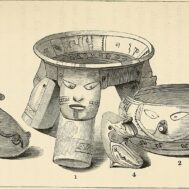On October 8th a debate took place at the House of Lords (UK) called ‘Reckoning with History: A Critical Discussion on the Reparations Debate’. The area of reparations for the slave trade and colonial expansions is becoming increasingly politicized along cultural lines. Cultural politics straddle party-political lines, as attested by the All-Party Parliamentary Group for Afrikan Reparations (APPG-AR). Founded in 2021, APPG-AR’s stated purpose is:
To bring together parliamentarians, campaigners, communities, and other stakeholders to examine issues of African Reparations and the repatriation of art and cultural artefacts, as well as exploring policy proposals on reparations and development, and how best to redress the legacies of African enslavement and colonialism.
A year ago, The Guardian reported on the group and its aim to take “a very distinct and clear call for reparative justice” and its inaugural conference that was to bring together “representatives from the Scottish National party, Green party and Labour party”. Notably, Conservative MPs are thin on the ground in this group, and it seems unlikely they will ever include any Reform MPs. However, the issues of reparations and repatriations are pulling every party, every institution and every person in Britain into the vortex of often highly politicized and ideologically based discussions. Moreover, cultural objects and their repatriations to countries and communities of origin have become entangled in the arguments about reparations for the Trans-Atlantic slave trade and Western European colonialism.
What stood out about Reckoning with History, organized by The Equiano Project, was the attempt to present a diverse range of views on the subject. The discussion was sufficiently wide-ranging to highlight the differences between the speakers’ positions. And what the speakers did not cover was covered by the audience members. A summary of the discussion is available from the Equiano Project. From my notes on the discussion, the panel members and their positions were:
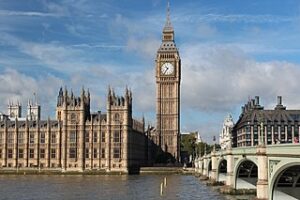
Big Ben, 24 September 2015, photo Mary Smith, CC0 1.0 Universal Public Domain Dedication.
Rasheed Griffith from the Caribbean Progress Studies Institute outlined the context of Caribbean reparations and pinpointed the “intellectual driving force” behind reparations as the ideas of Sir Hilary Beckles. He argued that the empirical data undermines the narrative that colonial legacies are the primary driving force for economic disparities in the Caribbean and that “too often the conversation shifts to the fault of the UK and not local doings”.
Prof. Robert Tombs addressed the influence of American culture and the imported US obsession with race politics. He stated that the examination of colonialism in the UK has become “our equivalent of slavery and segregation”, noting that discussions are being distorted with the ideology dictating the questions one asks, and the answers produced, with the pressure to approve what “seems fashionable”.
Prof. Alan Lester argued that slavery was part of the UK history and that there is “a prima facie case for reparations”. His main points were that: slaves were freed without compensation, the UK economy was due in part to the slave system, enslaved people could not inherit and pass assets in the Caribbean as they would have done had they not been transported from Africa, and that the British administrators did not fulfil their promises of the civilising mission and therefore Britain still has an obligation to these countries.
Tiffany Jenkins noted that the discourse is driven by museum professionals who wish to distance themselves from the past, and in some instances the museum professionals try to find communities that would take the objects. She noted two developments, one on the right and one on the left. On the right, is the proud, national history, exemplified by Kenneth Clark’s Civilization. On the left, is the struggle for the past as a supplicant for the future. Her opinion is that reparations reinforce fragility, pain, and victimhood and that while they decimate history, they do not offer a positive future.
One of the major disagreements was to do with the data and the context of specific cases. This brought to the fore the fact that discussions about reparations and repatriations far too often veer off into one size fits all solutions. When talking about reparations and repatriations, too often a case is referenced in one county and the findings applied across the board to other countries straddling the Caribbean and Africa.
Overall, the argument for reparations and repatriations relied on sweeping claims. For example:
- That the Trans-Atlantic slave trade system devastated Africa and the Caribbean.
- That it is a continuing contributing factor to the socioeconomic disparities for Caribbean people in the Caribbean and in the UK.
- That while the evidence of the disadvantage is “difficult to pinpoint”, it is “reasonable to assume because no assets [of the slaves] passed down the generations”.
- That Britain and Western Europe developed because of colonialism.
- That the developmental aid, reparations, repatriations, and mitigating climate change are connected remedies for the alleged historical moral injustice.
- That reparations are in the UK’s national interest because it will shore up UK’s soft power to counter the influence of China.

Statue of Oliver Cromwell, House of Lords, photo Olga Gillies, 8 October 2024, courtesy the author.
Some of this was challenged from the Caribbean perspective that emphasized local culpability, and the propensity to blame Britain when things are not going well. The idea of reparations itself was challenged from the American perspective with the participant pointing out that in the USA reparations and other affirmative measures did not result in a positive impact on African Americans. Others questioned whether the claims of disparities could be directly attributed to the claimed causes. After all, the Trans-Atlantic slave trade and British colonialism happened some generations ago. Another participant asked about what evidence exists that descendants of slaves are disadvantaged in the UK. The panel did not have specific studies to hand. The related question was whether it was fair for UK taxpayers to pay compensation for the alleged losses due to colonialism and the slave trade. Whether it is fair would largely depend on the proof of culpability. However, the reply was that the evidence is “difficult to pinpoint”. For many this might be the crux of the issue – is there concrete, measurable, uncontested proof of disparities traceable to British slavery, the slave trade and colonialism and no other factors? The question of fairness rests on the existence of such proof. Unfortunately, from the discussion, it was evident that such proof does not exist and that how we define and measure disparities and what they are attributable to sits at the core of many disagreements.
A line of discussion touched on the question of identifying victims of historical injustices. As Robert Tombs of History Reclaimed said, for any reparation claim to stand, there ought to be a perpetrator, an ill-gotten gain and a victim. Citing the Church of England case, he pointed out that the proposed CofE reparations would go “to black fund managers, social entrepreneurs and historians” and that while as a historian he welcomes the latter, these “are not generally thought of as the principal victims”.
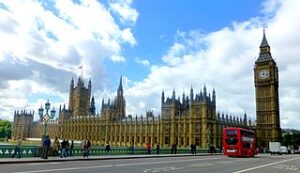
London, Big Ben and Houses of Parliament, photo Giggel, 16 September 2013, CCA 3.0 license.
A lawyer pointed out that from the legal perspective, one should consider “but for the act, would the position of the person be worse off?” He pointed to the fact that the individuals affected by the act – enslavement – no longer exist in this case and asked whether the distant relations are worse off than their relations in Africa? This was picked up by other audience members pointing out that the descendants in the USA and the diaspora were better off than the populations in Africa.
Another line of discussion revolved around the moral justice question and moralising. The case of the Benin bronzes and their return to the Oba of Benin came up. An audience member asked whether it was fair to return these objects to the beneficiaries of the Nigerian slave trade. Someone pointed out that Britain traded slaves too. While historically accurate, this somewhat missed the point, given that the discussion was about reparations for the slave trade. Following the argument about soft power earlier, if Britain is to use reparations and repatriations as soft power and enforce the moral rightness of reparations and repatriations as atonement for the past slave trading and colonialism, then in effect, it asks others to follow suit and atone for their slave trading and colonialism. The exclusion of the wider context of the enslavement of the non-Africans across the world, of the Africans from the east coast of Africa, of the Europeans by the Africans and of numerous colonisations and coercive colonial-like controls past and present were brought up in several questions and comments on the discussion. Many points touched on the question of why these wider histories and contexts are excluded from the discussion on reparations for slavery and colonialism.
It was rather unsurprising to hear the claim that the Benin objects were stolen and that giving them back is a matter of justice. This claim has been made consistently by the proponents of repatriations. What stood out about this part of the discussion was the point about conflating moral justice with the economic improvement of certain groups. As the person pointed out, post-WWII reparations were about moral justice whereas today reparations appear to be about addressing economic inequality. The question was, if it is about economic inequality then should we still think of them as reparations?
Several questions picked up on the difference between on the one hand the past, justice, grievances and victimhood and on the other the future, freedom, equality, agency and resilience. The overwhelming sentiment was about focusing on the latter and moving away from reinforcing wounds and incentivizing perpetual grievances, especially given the difficulties in identifying the victims today.
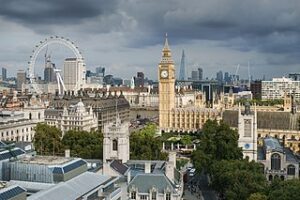
The Palace of Westminster (Houses of Parliament) from the dome on Methodist Central Hall, photo Colin, 21 September 2014, CCA-SA 4.0 International license.
While the discussion was rich and complex, major problems were highlighted in the perception of who the victims are and what evidence there is to support the claims. For the proponents of reparations and repatriations, the Caribbean and Africa form a Pan-African victim of the white Western slave trade, colonisation and oppression with the emphasis on the moral imperative to recognise the past moral injustice of the Trans-Atlantic slave trade and the suffering of the estimated 12.5 million human beings transported from the West Coast of Africa. For others, the context of slave trading and colonizations is not so narrow and is more diverse and inclusive in the consideration of multiple societies across the world, the contemporary issues are more pressing, including more than 40 million in modern slavery and 152 million in child labour today, and the empowering of people to achieve their best irrespective of their ancestral history takes precedence.
The arguments and questions voiced at ‘Reckoning with History’ will be stated and restated over and over – this discussion is not likely to go away during the Labour’s term at the very least. The Don’t Divide Us representative hit the nail on the head by voicing a concern that what reparations appear to create is the moral framework of redistribution but at the expense of undermining the framework of equality. The questions the discussion left open are whether reparation and repatriation and their discussions can make positive progress towards a resolution of perceived grievances without shattering the framework of equality, without destroying the principle of fairness, without denying agency, and without negatively impacting the future by demonizing the past.
After the meeting.

Houses of Parliament, photo Nikolai Karaneschev, 23 June 2010, CCA 3.0 Unported license.
On 13th of October, it was reported that David Lammy, UK Foreign Secretary, met with Sir Hilary Beckles. Beckles called “for a summit to work through what a reparatory justice model ought to look like” and for Lammy “to be given the power to secure reparations from Britain over its role in the slave trade”. The Independent reported that in 2018, while a backbencher, Lammy supported reparations: “I’m afraid as Caribbean people we are not going to forget our history – we don’t just want to hear an apology, we want reparation”. At the time of writing, the Commonwealth leaders are meeting at the biannual summit in Samoa. During this summit, the 56 member countries will chose its next secretary-general from 3 candidates: Shirley Botchwey of Ghana, Joshua Setipa of Lesotho and Mamadou Tangara of Gambia. All three are from Africa, and all three expressed support for reparations for the Trans-Atlantic slavery and colonialism. Setipa is reported to have said that the UK owes India “more money than it has” for colonialism during an interview with The Financial Times.
Prior to the summit a No 10 spokesman insisted Sir Keir would not bow to calls for reparations, saying: “Just to be clear, reparations are not on the agenda for the Commonwealth Heads of Government Meeting [CHOGM]” and that “the Government’s position has not changed. We do not pay reparations.” However, it remains to be seen how the issue progresses, given Labour government’s own MPs’ support for reparative justice, as attested by the APPG-AR, the direction of the Commonwealth under a secretary-general supportive of reparations, the planned Caribbean delegation to the UK in 2025 to renew their demands for reparations, and the pressure from UK’s institutions, not least the Church of England, where the calls for slavery reparations appear to have acquired a very personal character in the form of Archbishop of Canterbury Justin Welby’s ancestral links to slave owners in the Caribbean.
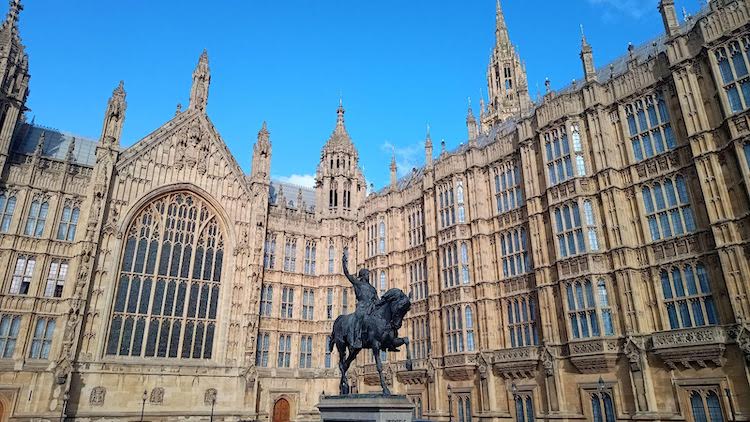 Statue of Richard I, The Houses of Parliament, House of Lords, photo Olga Gillies, 8 October 2024, courtesy the author.
Statue of Richard I, The Houses of Parliament, House of Lords, photo Olga Gillies, 8 October 2024, courtesy the author. 
